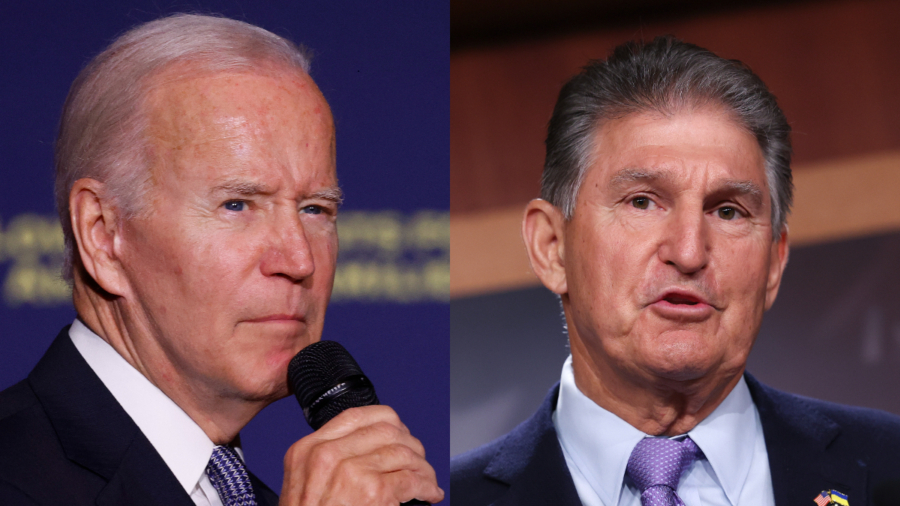Senator Joe Manchin (D-W.Va.) said his fellow Democrat, President Joe Biden, has staked out a “hypocritical” position in recent debates over how to raise the U.S. debt limit.
Biden has repeatedly called for a so-called “clean bill” to raise the debt limit without any additional conditions on matters such as spending reforms. In an interview with CNN on Tuesday, Manchin criticized Biden’s position.
“It’s not rational, it’s not reasonable, and it’s not practical,” Manchin told CNN’s Manu Raju.
Biden and other members of his administration have argued that Republican lawmakers, who are leading the efforts to impose spending reforms, have previously accepted debt-ceiling increases without adding new spending control measures. Manchin argued that the only times there aren’t contentions over a debt-limit increase is when one political party controls the White House and both houses of Congress.
“It’s hypocritical to say that we’re not going to do it now when we’ve done it every time that there has been a split in the party,” Manchin said.
Manchin went on to say that it’s “not reasonable” to insist that there be no spending cuts or conditions attached to a debt-limit increase.
The United States is currently hovering at around $31.4 trillion in debt, the statutory limit without an increase. The nation is also facing a potential default on its debt obligations as early as June—if an agreement isn’t reached.
On April 25, the Republican-majority House of Representatives passed the “Limit, Save, Grow Act of 2023,” which would allow the United States to take on up to $1.5 trillion in new debt through March 31, 2024—in exchange for spending cuts and reforms that are estimated to reduce spending by about $4.8 trillion over the next decade.
The Limit, Save, Grow Act of 2023 faces tougher odds of passing in the Democrat-controlled Senate, and Biden has vowed to veto the bill if it does come to his desk.
On Saturday, 43 of the 49 Republicans in the Senate signed a letter vowing to oppose a debt-limit increase without “substantive spending and budget reforms.”
Manchin has said he does not agree with every aspect of the Republican-led “Limit, Save, Grow Act,” but credited House Republicans with offering a solution—and called on Biden to negotiate with House Speaker Kevin McCarthy (R-Calif.)
NTD News reached out to the White House for comment but did not receive a response by the time this article was published.
Democrats Float Debt Limit End Run Strategies
The Biden administration and its allies have cast the Republican demands to attach spending reforms to a debt limit increase as a hostage situation in which the United States faces a default on its debt if Democrats don’t agree to the new spending conditions.
Democrats have been weighing a number of strategies to circumvent a negotiation with Republicans over spending reforms.
In a May 2 letter to his fellow democrats, House Minority Leader Hakeem Jeffries (D-N.Y.) said the Democrats could attempt to force a House floor vote for a clean debt limit increase through a discharge petition. The discharge petition strategy would need a simple 218-vote majority to pass, but it is unlikely to succeed in the Republican-controlled House.
Biden has recently begun discussing a different strategy to circumvent a spending reform negotiation. Biden’s strategy would rely on an untested legal theory that he could invoke the 14th Amendment to declare the debt limit unconstitutional.
The 14th Amendment reads, in part, that “the validity of the public debt of the United States … shall not be questioned.”
Conservative critics of the 14th Amendment debt-limit theory argue that the language of the amendment means that while the U.S. government cannot excuse itself of its existing debts, that doesn’t necessarily mean a president can invoke the amendment to increase the debt limit and take on new debt.
“The Constitution vests in Congress, and withholds from the Executive, the power to commit to spending, to raise revenue by enacting taxes, and to incur public debt. The Fourteenth Amendment does not alter this. Congressional control of borrowing, through the debt limit, and section four of the amendment are in unison, not tension,” the conservative Heritage Foundation wrote in 2011 when Democrats floated the 14th Amendment theory as a way to circumvent a previous debt-limit impasse.
The Heritage Foundation further argued that a default on the national debt does not actually constitute questioning the validity of the debt. The foundation noted that debtors may commit to repaying a debt even after declaring bankruptcy.
“Insolvency, in itself, does not impugn the validity of a debt, but only the debtor’s present ability to pay,” the Heritage Foundation added.

